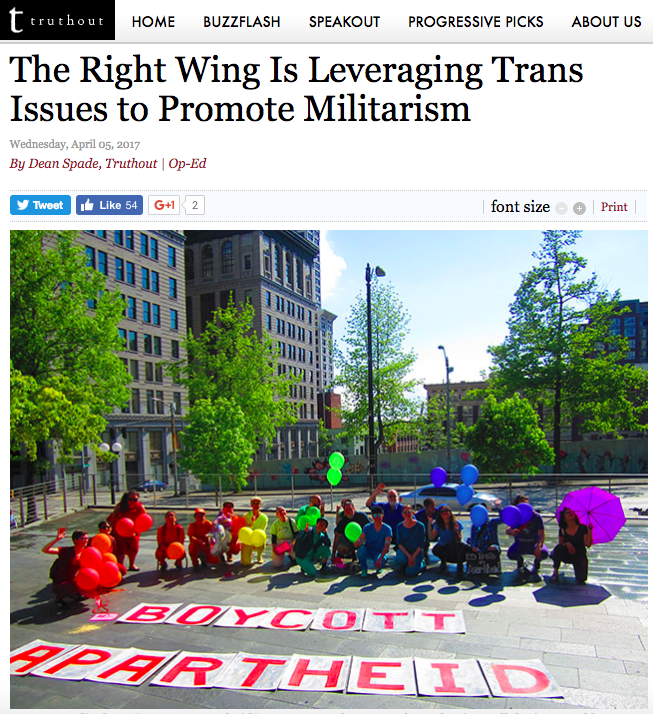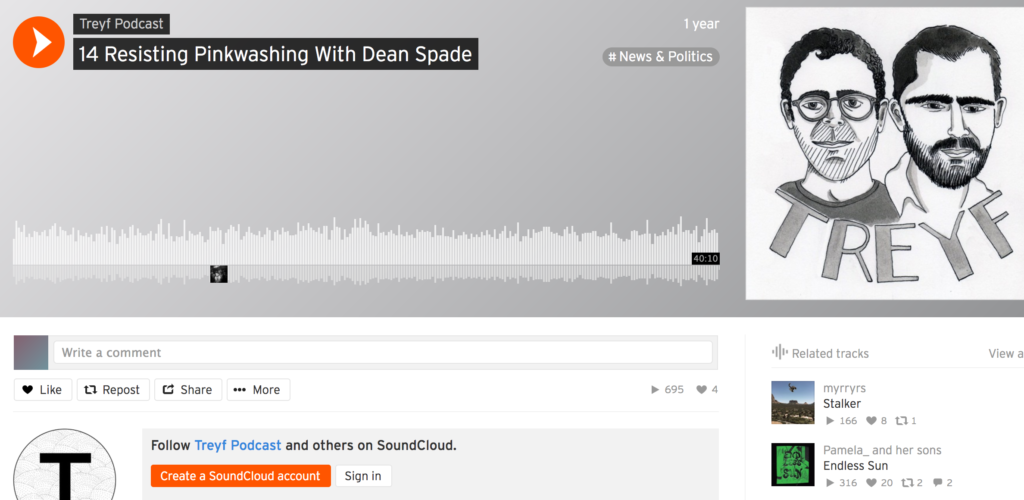I was thrilled to be the first guest on the new Mutual Aid Podcast. Very fun conversation with people who are deeply engaged with mutual aid work and coming from non-US locations. You can listen here:
New Debate/Conversation with Aaron Belkin about Trans Military Inclusion Advocacy
Aaron Belkin and I just published this debate/conversation about our opposing views on trans military inclusion advocacy. I hope it will be a useful tool for classrooms and reading groups, and people wanting to understand this debate.
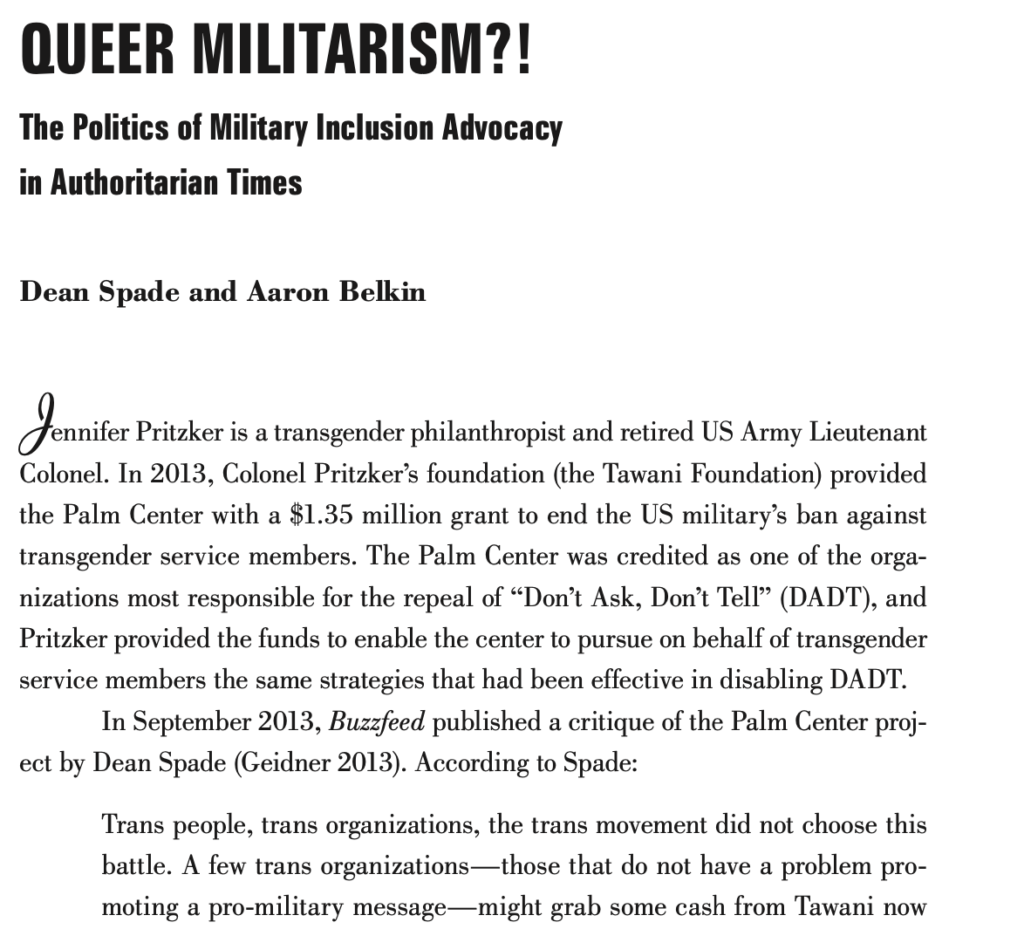
New Interview with Them about Why I Oppose Trans Military Inclusion Advocacy
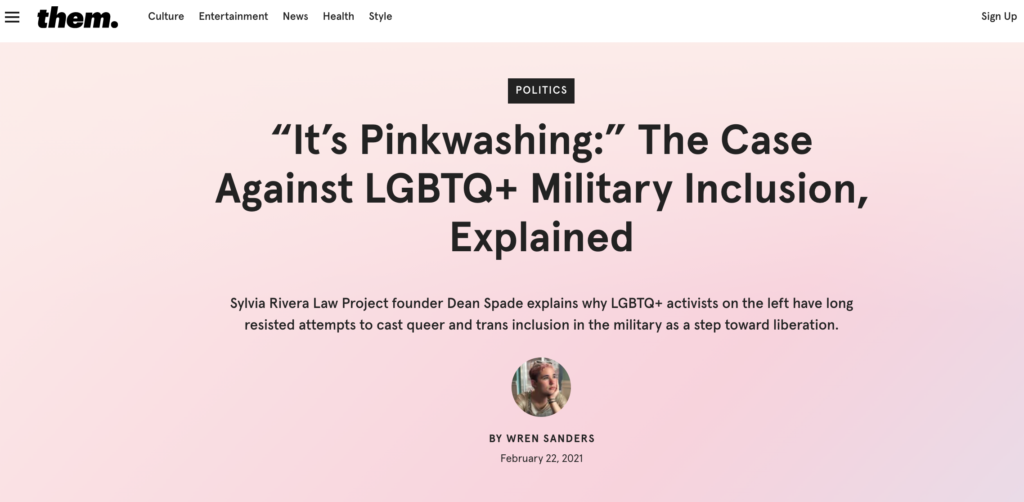
Just five days after being sworn in as the 46th President of the United States, Joe Biden signed an executive order overturning former President Trump’s ban on openly transgender Americans serving in the military. “All Americans who are qualified to serve in the Armed Forces of the United States should be able to serve,” it read, going on to argue that an “inclusive military strengthens our national security.”
Biden’s executive order, one of a flurry he signed during his administration’s first week, marked the fulfillment of one of his foremost policy proposals regarding the advancement of LGBTQ+ equality in America. More specifically, the order counteracted a 2017 directive by the Trump administration banning openly trans folks from the armed services — itself a reversal of the Obama administration’s 2016 order that paved the way for trans Americans to serve in the military without hiding their gender identity.
Continue reading “New Interview with Them about Why I Oppose Trans Military Inclusion Advocacy”Video of Conversation about Pinkwashing and Solidarity with WWU’s SUPER Chapter
For Israeli Apartheid week, I joined the SUPER chapter at Western Washington University and gave a talk on pinkwashing and how it emerged from a rights-based gay liberal inclusion politics, and what it looks like to resist that politics and center racial and economic justice in queer and trans liberation work. The first two minutes have some strange audio so I recommend skipping to 2:00 and diving in from there.
My Latest Writing on Pinkwashing: The Right Wing Is Leveraging Trans Issues to Promote Militarism
I wrote this article on the dangerous ways the right is using trans people to promote right-wing security and military agendas alongside its violent backlash against trans people. Among these tactics is the Israeli government’s “Brand Israel” campaign developed over a decade ago to promote a positive public image of Israel, foment anti-Muslim racism, and distract from Israel’s brutal occupation of Palestine and apartheid regime.
Excerpt: “[T]he use of a thin LGBT inclusion politics to make the Israeli or US military appear progressive is becoming a losing strategy. Resistance to pinkwashing is rising, and each controversy exposes new communities to the critique of this propaganda. A growing number of Jews in the US, especially young people, are becoming critical of Israel. The Movement for Black Lives has made its solidarity with the struggle for Palestinian liberation clear, helping many people in the US see the connections between US and Israeli racism and state violence. Cross-movement organizing between Indigenous people in North America, including Water Protectors, and Palestine liberation activists is helping people see the links between US and Israel as settler-colonialism.”
Resist Pinkwashing in Seattle NOW!
Interview about Drugs and Sex and Bathrooms
It was exciting to receive the new issue of Original Plumbing that includes an interview I mentioned before that has had me looking back at old zines and photos from the 1990’s and early 2000’s. Here is the text and some photos of how the editors laid it out in the magazine. Thanks to Amos and Rocco! 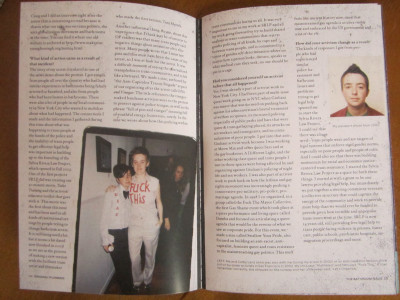
OP: Can you tell me what happened to you in Grand Central in 2002? DS: In February 2002, I attended the protest against the World Economic Forum meetings that were being held in New York City. It was a large anti-globalization protest, similar to the protests that had happened in 1999 in Seattle against the World Trade Organization, in Quebec City in 2001 against the proposed Free Trade Area of the Americas. These were all protests against summits where the rich and powerful gathered to plan economic policies that harm most people and the planet. It was also very shortly after the World Trade Center bombing on 9/11/01. The New York City government prepared for the protest by turning out the police in outrageous numbers. I participated in the protest with friends, and then we left. On our way home we decided to go to Grand Central Station to use the bathrooms because we had been out in the streets for hours and were in need. I went into the men’s a cop followed me, stopped me and asked for my ID. I explained that I was in the right place and I just needed to use the bathroom, and the cop started to arrest me. My friend Craig saw the cop follow me in and went in to see if I was okay. He and our friend Ananda who was nearby in the corridor both tried to intervene and advocate for me and they were arrested too. Others of our friend who were with us tried to get to us and were held back by a line of riot cops who showed up. We spent about 24 hours in jail. When we were transferred from the jail where we’d been to the cells at the court, a random court-appointed laywer came to talk to me about my arraignment. I had recently graduated law school but had never represented anyone in criminal court and didn’t really know what was going on or what was going to happen to me, or even whether or not I could actually be convicted of something. The lawyer who came to talk to me asked me about my genitals and when I told him I did not think it was relevant, he was mean and dismissive. It was really scary to see how even though, in so many ways, I was so privileged in this situation being a white person, employed, fancy-educated person, I felt really vulnerable in this system facing transphobia from the cops & the lawyer. Craig and I did an interview right after the arrest that is interesting to read because it shares what our take was on trans politics, the anti-globalization movement and bathrooms at the time.
OP: What kind of action came as a result of that incident? DS: The story of my arrest circulated as one of the news items about the protest. I got emails from people all over the country who had had similar experiences in bathrooms being falsely arrested or harassed, and also from people who had been beaten in bathrooms. There were also a lot of people in my local community in New York City who wanted to mobilize about what had happened. The connections I made and the information I gathered during this time about what was happening to trans people at the hands of the police and the inability of trans people to get effective legal help was important in building up to the founding of the Sylvia Rivera Law Project, which opened in Fall 2002. One of the first projects SRLP did was creating our 30 minute movie, Toilet Training and the activist/educator toolkit that goes with it. This movie was the first about this issue and has been used in all kinds of institutional settings by people trying to change bathroom access. It is still being used a lot, but it seems a bit dated now (finished in 2003) so we are in the process of making a new version with the brilliant trans artist and filmmaker who made the first version, Tara Mateik. Another influential thing, for me, about this experience that I think may be of interest to OP readers was that many trans people said negative things about me online after this arrest. Many people wrote that I must not pass and this must have been the cause of my arrest, so I was at fault for the arrest. It was a difficult moment of seeing the internalized transphobia in trans communities, and it felt like a betrayal. We made a zine, authored by “the Anti-Capitalist Tranny Brigade” as part of our organizing after the arrest called Piss and Vinegar. The title references the vinegar-soaked bandanas activists wore to the protest to protect against police teargas, as well as the phrase “full of piss and vinegar” meaning full of youthful energy, boisterous, rowdy. In the zine we wrote about how this policing within trans communities harms us all. It was very important to me in my work at SRLP and all my work going forward to try to build shared analysis in trans communities that rejects gender policing of all kinds, by cops and between trans people, and is committed to a vision of gender self-determination where no matter how a person looks, dresses, speaks or what medical care they seek, no one should be put in a cage. 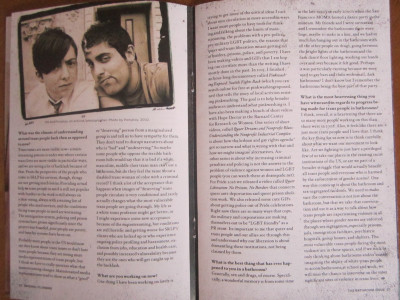
OP: Had you considered yourself an activist before that all happened? DS: Yes, I was already a part of activist work in New York City. I had been part of multi-issue queer work going on in NYC when Giuliani was mayor that was focused pushing back against his administration’s brutal treatment of welfare recipients, its increased policing (especially of public parks and bars that were queer & trans gathering places), its attacks on sex workers and immigrants, and its criminalization of poor people. I got into that anti-Giuliani activist work because I was working at Meow Mix and other queer bars and at the gay bookstore A Different Light, and the other working class queer and trans people I met in those spaces were being affected by and organizing against Giuliani’s policing of night life and sex workers. I was also part of activist work to push back on how the lesbian and gay rights movement was increasingly pushing a conservative pro-military, pro-police, pro-marriage agenda. In 1998 I co-organized, in a group called the Fuck The Mayor Collective, the first Gay Shame event which took place at a queer performance and living space called Dumba and focused on articulating a queer agenda that would be the reverse of what we saw at corporate pride. For this event, we made a zine called Swallow Your Pride, also focused on building an anti-racist, anti-capitalist, feminist queer and trans resistance to the mainstreaming gay politics. This stuff feels like ancient history now, since that mainstreamed gay agenda is so ultra visible now and embraced by the US government and a lot of the 1%.
OP: How did your activism change as a result? DS: The kinds of responses I got from people who had experienced similar police harassment and bathroom issues and problems trying to get legal help spurred me to start the Sylvia Rivera Law Project. I could see that there was a huge need–trans people were and are targets of legal systems that enforce rigid gender norms, especially on poor people and people of color. And I could also see that there was building momentum for racial and economic justice centered trans resistance. I started the Sylvia Rivera Law Project as a space for both these things. I started it with a grant to be one lawyer providing legal help, but immediately we put together a steering committee to create a collective structure that could capture the energy of the community and work to provide more help than we would ever be funded to provide given how invisible and unpopular trans issues were at the time. SRLP is now 14 years old, still providing free legal help to trans people facing violence in prisons, foster care, public schools, psychiatric hospitals, immigration proceedings and more.
OP: What was the climate of understanding around trans people back then as opposed to now? DS: Trans issues are more visible now–a mainstreaming process is under way where certain trans lives are more visible in particular ways, and we are seeing a lot of backlash because of that. From the perspective of the people who come to SRLP for services, though, things are not getting much better. Providing actual help to trans people in need is still not popular with funders so the work is still always on a shoe-string, always with a waiting list of people who need services, and the conditions facing trans people in need are worsening. The immigration system, policing and prison systems have grown significantly since the project was founded, poor people are poorer, and benefits systems have been cut. Probably more people in the US would now say they know about trans issues or don’t hate trans people because they are seeing more media representations of trans people, but I think we have to really question what that mainstreaming changes. Mainstreamed media representations tend to show us what a “good” or “deserving” person from a marginalized group is and tell us to have sympathy for them. They don’t tend to disrupt narratives about who is “bad” and “undeserving.” So maybe some people who oppose the terrible bathroom bills would say that it is bad if a white, masculine, middle class trans man can’t use a bathroom, but do they feel the same about a disabled trans woman of color with a criminal record? I think a lot of the acceptance that happens when images of “deserving” trans people circulate is very conditional and rarely actually changes what the most vulnerable trans people are going through. My life as a white trans professor might get better, or I might experience some new acceptance because of the mainstreaming, but conditions are still horrific and getting worse for SRLP’s clients who are locked up or who experience ongoing police profiling and harassment, exclusion from jobs, education and health care, and possibly increased vulnerability because they are the ones who will get caught up in the backlash. 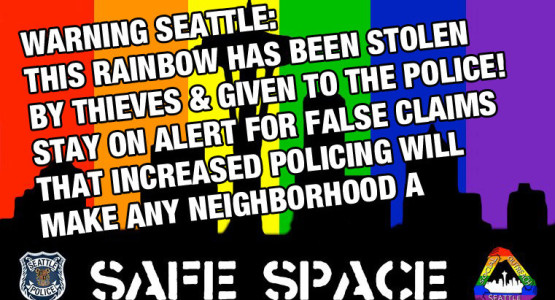
OP: What are you working on now? DS: One thing I have been working on lately is trying to get more of the critical ideas I care about into circulation in more accessible ways. I want more people to have tools for thinking and talking about the limits of mainstreaming, the problems with a pro-police, pro-military LGBT politics, the reasons that queer and trans liberation means getting rid of borders, prisons, police, and poverty. I have been making videos and GIFs that I am hoping can circulate more than the writing I have mostly done in the past. In 2015, I finished an hour-long documentary called Pinkwashing Exposed: Seattle Fights Back (online for free) that tells the story of local activists resisting pinkwashing. The goal is to help broader audiences understand what pinkwashing is. I have also been making a bunch of short videos with Hope Dector at the Barnard Center for Research on Women. One series of short videos, called “Queer Dreams and Nonprofit Blues: Understanding the Nonprofit Industrial Complex” is about how the lesbian and gay rights agenda got so narrow and what is wrong with that and how we might imagine alternatives. Another series is about why increasing criminal penalties and policing is not the answer to the problem of violence against women and LGBT people (you can watch these at deanspade.net). For Pride 2016 we released a video called “Queer Liberation: No Prisons, No Borders” that connects queer anti-deportation and queer prison abolition work. We also released some cute GIFs about getting police out of Pride celebrations. Right now there are so many ways that cops, the military and corporations are making themselves out to be “LGBT friendly” as a PR stunt. Its important to meet that queer and trans people and our allies see through this and understand why our liberation is about dismantling these institutions, not being claimed by them. 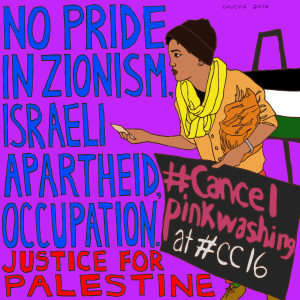
OP: What is the best thing that has ever happened to you in a bathroom? DS:Generally, sex and drugs, of course. Specifically, a wonderful memory is from some time in the late 1990’s or early 2000’s when the San Francisco MOMA hosted a dance party in the museum. My friends and I were on ecstasy and I remember the bathrooms there were huge, maybe 10 sinks in a line, and we had so much fun hanging out in the bathroom with all the other people on drugs, going between the bright lights of the bathroom and the dark dance floor lighting, washing our hands over and over because it felt good. Perhaps it was particularly exciting because we were used to gay bars and clubs with small, dark bathrooms? I don’t know but I remember the bathrooms being the best part of that party.
OP: What is the most heartening thing you have witnessed in regards to progress being made for trans people in bathrooms? DS: I think, overall, it is heartening that there are so many more people working on this than there were in 2002. Also, it feels like there are just more trans people and I love that. I think the key thing for us now is to think carefully about what we want our movement to look like. Are we fighting to just have a privileged few of us take our places in the existing racist institutions of the US, or are we part of a broader struggle that would actually benefit all trans people and everyone who is harmed by the enforcement of gender norms? One way this comes up is about the bathroom and sex-segregated facilities. We need to make sure the conversation is not just about the bathroom, but that we take that conversation and use it as a way to talk about how trans people are experiencing violence in all the places where gender norms are enforced through sex segregation, especially prisons, jails, immigration facilities, psychiatric hospitals, group homes, and shelters. The most vulnerable trans people facing the most violence are in these spaces, and if we stick to only thinking about bathrooms and/or mainly imagining the ability of white trans people to access bathrooms at school and work, we will miss the chance to intervene on the most significant sites of violence in trans lives.
Interview about Pinkwashing on the Treyf Podcast
Legal Equality, Gay Numbers and the (After?)Math of Eugenics, co-authored with Rori Rohlfs
I wrote this essay, “Legal Equality, Gay Numbers and the (After?)Math of Eugenics” with Rori Rohlfs for S&F Online: Navigating Neoliberalism in the Academy, Nonprofits, and Beyond, edited by Soniya Munshi and Craig Willse, in 2016. You can read it here.
Creating Change: Pinkwashing ICE, Pinkwashing Israel
On January 12, the National Gay and Lesbian Task Force issued an apology for including a panel by Immigration and Customs Enforcement (ICE) in the program of the upcoming Creating Change Conference. Familia: Trans Queer Liberation Movement, an organization that fiercely opposes the violence of immigration enforcement and has been part of the inspiring national #Not1More anti-deportation campaign, issued a response to the NGLTF apology: Apology Not Accepted. Familia refused NGLTF’s weak acknowledgement after the uproar that ICE’s inclusion in the conference had caused. The problem with ICE being on the Creating Change program is not just that it makes people feel unsafe (it is a no-brainer that you shouldn’t invite ICE to events where you want immigrant activists to be able to participate), it’s that ICE is a massive source of violence in the lives of queer and trans people and an institution that queer and trans activists are trying to end. Inviting ICE to participate in the conference suggests that there is some kind of collaboration sought, or that ICE can show up and be “LGBT-friendly.” Familia called out the reality that by including ICE, NGLTF ignored and rejected the clear anti-deportation, anti-immigration enforcement politics and strategy that has been articulated by queer and trans immigrant activists. We are not fighting for a gay-friendly border, a gay-friendly immigration prison or immigration raid. The only way for queer and trans immigrants to be safe is if raids, detentions, deportations and everything else ICE does ends.
There is another controversy brewing on the Creating Change program that presents a similar dynamic. The Israel advocacy organization, A Wider Bridge, is hosting a shabbat service and reception at Creating Change. A Wider Bridge aims to connect LGBT people in the US with Israel and promote the image of Israel as an LGBT tourism destination. It coordinates tours funded by the Israeli Consulate bringing LGBT Israelis to the US to talk about gay politics in Israel, it hosted a conference with many US LGBT leaders last summer in Israel and had those leaders participate in Gay Pride in Tel Aviv, it promotes Israeli-government funded films that portray Israel as a haven for gay rights in which Palestinians seek refuge, and it brings tours of LGBT people from the US to Israel. Its website proudly announces that it “led the LGBT contingent in New York’s Celebrate Israel Parade, and . . . marched with the Israeli Consulate in the New York Pride Parade.”
Queer and trans activists who are working to oppose Israeli colonialism and apartheid call this propaganda work “pinkwashing.” For over a decade, the Israeli government has been engaged the “Brand Israel” campaign, aimed to respond to the growing movement against apartheid in Israel by portraying Israel as “relevant and modern.” An important part of this effort has been to promote Israel as a gay-friendly country, touting the fact that gay people are allowed to serve in its brutal military and promoting Israel as a gay tourism destination. This message relies on Islamophobia and anti-Arab racism as Israel contrasts its supposed “gay-friendliness” with stereotypes of its homophobic neighbors, particularly portraying Palestinians as homophobic. Queer and trans activists around the world who oppose occupation and apartheid have called this propaganda strategy “pinkwashing” because it is a direct effort to conceal the extreme violence and harm that Israel inflicts on Palestinians, including queer and trans Palestinians, by promoting Israel as “gay friendly.”
In 2012, activists in Seattle got to know A Wider Bridge and its pinkwashing activities very intimately when A Wider Bridge partnered with the homophobic, right-wing organization Stand WithUs to bring an Israeli Consulate-sponsored pinkwashing tour to Seattle. Queer and trans Seattle activists pushed back, exposed the propaganda and got a planned tour event at Seattle City Hall canceled. We faced a very unpleasant backlash and made a film about our story (which you can watch for free online).
We made this film in hopes that it will help queer and trans people and people who care about queer and trans people to read and interpret propaganda that tries to play on our movements’ messaging to build PR for violent governments and institutions. Clearly, the organizers of Creating Change need some help with this–ICE and A Wider Bridge ended up on the program because they packaged themselves as dialoguing about LGBT issues. This is the new normal–police departments, prisons, the military, immigration enforcement and politicians and nefarious governments are all branding themselves as progressive, liberal and right-on with talking points about LGBT inclusion, meanwhile continuing their murderous work that harms queer and trans people and cannot be aligned with our liberation. When left movements across the US are calling attention to the racist violence of the immigration and criminal punishment systems, when more and more organizations are adopting resolutions to boycott and divest from Israel and the prison industry, queer and trans organizations have to get sharp about not becoming fig leaves or propaganda sites for institutions scrambling to prop up their tarnished images as their violence is exposed.
![[Image by Micah Bazant]](http://www.deanspade.net/wp-content/uploads/2016/01/pinkwash-flat-300x169.jpg)
My regret about our film, Pinkwashing Exposed: Seattle Fights Back! is that we did not focus enough on A Wider Bridge. At the time, it made sense to focus on how Stand With Us co-coordinated the events, because they are such an obvious right wing Israel advocacy organization which an insincere interest in queer issues that is only about the propaganda opportunities for Israel. It seemed like focusing on Stand With Us made the pinkwashing more obvious. In the months that followed the completion of the film, it became clear to me that we should have also focused on A Wider Bridge, whose pinkwashing strategy is more insidious. Many people who would be suspicious of explicit Israel advocacy because they have some vague sense that Palestinians are suffering under occupation are swept up in the friendly images of gay Israelis sharing their experiences and inviting people from the US to visit. Many people who know nothing about the occupation are learning about Israel from an Israel propaganda organization and not realizing it because it seems like a gay organization. A Wider Bridge denies that it is engaged in pinkwashing, but there is nothing secret about it being an Israel advocacy organization. It is not an organization focused on LGBT Jews, or an organization focused on LGBT Israelis, it is an organization focused on linking LGBT people in the US to Israel, the settler colonial nation engaged in apartheid, condemned by the world. It is an organization whose promotion of Israel is designed to make people think of Israel as a site of liberation and freedom rather than a regime producing colonization and genocide. As a Jewish trans activist who has sometimes attended Creating Change over the years, I like the idea of having a Shabbat service at the conference, but I do not want Creating Change to invite any Israel advocacy organization to lead it or host programming focused on promoting propaganda about Israel.
I believe that the organizers of Creating Change intend for the conference to be a place of progressive queer and trans politics–they would not want it sponsored by Wal-Mart, featuring workshops by gay climate change deniers, celebrating the leadership of gay conservatives. Over the years, there have been many, many controversies in which activists have called out the failures of the conference to live up to its progressive aims–most frequently regarding issues that impact queer and trans people of color. That is an important process and the work that activists have done to raise hell at Creating Change has forging new collaborations, changed queer and trans politics, and even changing the conference in some ways. Pinkwashing is now a ubiquitous and effective strategy for harmful institutions to promote a false image of themselves, and queer and trans activists have to sharpen our ability to discern it and hold organizations like NGLTF that purport to cultivate queer and trans liberation accountable when they partner with pinkwashers. The organizers who exposed the ICE participation in Creating Change won an important victory over pinkwashing by getting ICE taken off the program. Now NGLTF needs to take an active role in preventing pinkwashing of Israel at this year’s conference.
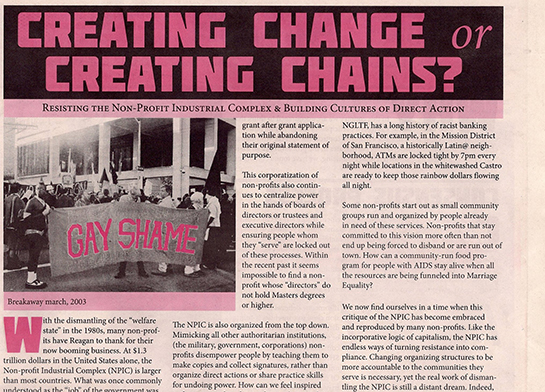
[Image from leaflet handed out by Gay Shame activists at Creating Change 2005 in Oakland.]
